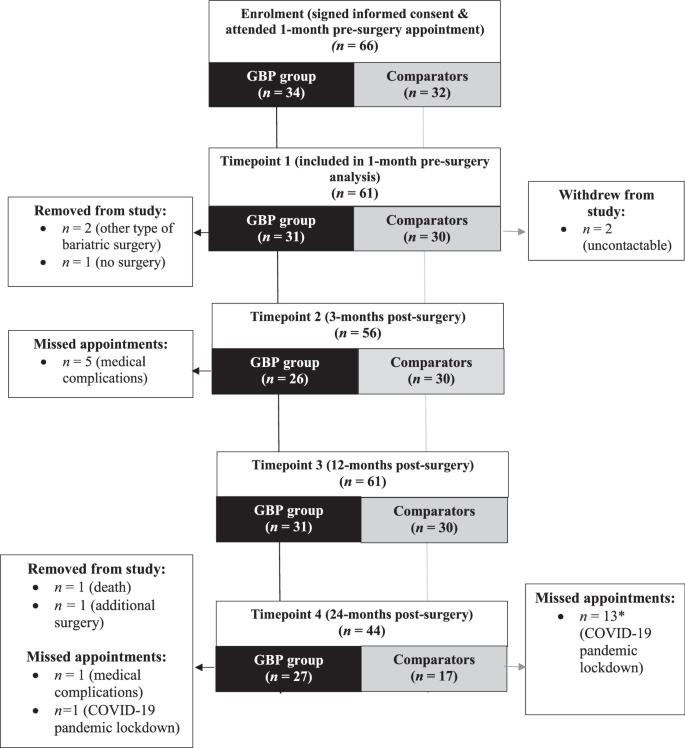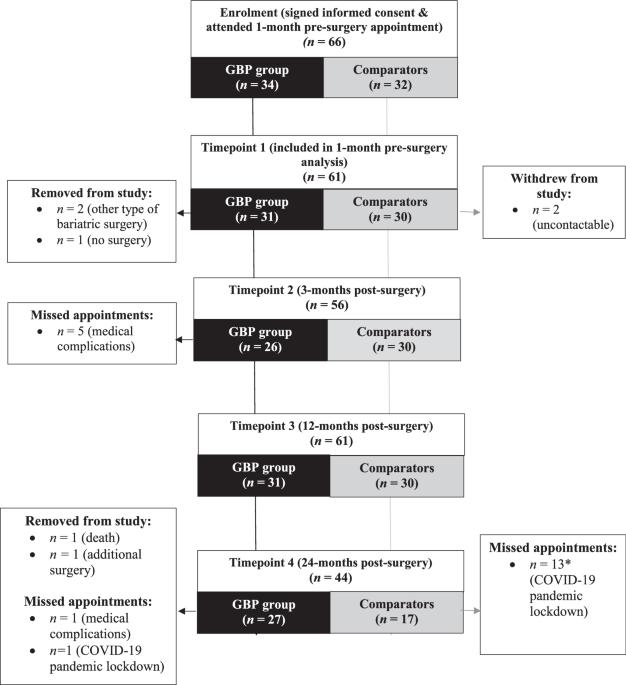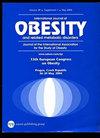胃旁路手术后的代谢适应:为期两年的观察研究结果。
IF 4.2
2区 医学
Q1 ENDOCRINOLOGY & METABOLISM
引用次数: 0
摘要
背景/目的:代谢适应是指基础代谢率(BMR)的降低超出了根据脂肪量(FM)和无脂肪量(FFM)的变化所预测的水平,可能会阻碍减肥的进展。目前还不清楚胃旁路手术(GBP)后是否会发生代谢适应,以及这种适应是否会持续。本研究的目的是评估胃旁路手术后患者与体重稳定的参照组相比,身体成分变化无法解释的基础代谢率下降情况:接受 GBP 的 31 名患者[77.4% 为女性;平均 BMI 45.5(标清 7.0)kg/m2;年龄 47.4(11.6)岁]和 32 名时间匹配的对比组患者[50% 为女性;BMI 27.2(4.6)kg/m2;年龄 41.8(13.6)岁]分别在手术前 1 个月、手术后 3 个月、12 个月和 24 个月接受评估:方法: 在标准化居住条件下,使用间接热量计测量血液中的热量,并使用 DXA 测量身体成分。线性回归分析评估了手术后的代谢适应性:结果:手术后,患者体重减轻了四分之一[-25.6%(1.8%); p 结论:这些结果表明,手术后的新陈代谢适应性具有潜在的潜力:这些结果表明,手术存在一种潜在的生物机制,可减轻预期的术后 BMR 下调,从而帮助 GBP 患者保持体重减轻。本文章由计算机程序翻译,如有差异,请以英文原文为准。


Metabolic adaptation following gastric bypass surgery: results from a 2-year observational study
Metabolic adaptation is the lowering of basal metabolic rate (BMR) beyond what is predicted from changes in fat mass (FM) and fat-free mass (FFM) and may hamper weight-loss progression. It is unclear whether metabolic adaptation occurs following gastric bypass surgery (GBP) and if it persists. The aim of this study was to evaluate the reduction in BMR that is not explained by changes in body composition in patients following GBP compared to a weight-stable comparator group. Thirty-one patients [77.4% female; mean BMI 45.5(SD 7.0) kg/m2; age 47.4(11.6)y] who underwent GBP, and 32 time-matched comparators [50% female; BMI 27.2(4.6) kg/m2; age 41.8(13.6)y) were evaluated at 1-month pre-surgery, 3-, 12- and 24-months post-surgery. BMR was measured under standardised residential conditions using indirect calorimetry and body composition using DXA. Linear regression analyses assessed metabolic adaptation post-surgery. After surgery, patients lost a quarter of their body weight [−25.6%(1.8%); p < 0.0001] consisting mainly of FM (4:1 FM to FFM loss ratio) at 24-months post-surgery. Absolute BMR (MJ/d) reduced by 25.7% at 24-months post-surgery with values becoming similar to the comparator group from 3-months post-surgery. Positive associations were observed between changes in BMR and changes in FFM and FM (P < 0.03). Metabolic adaptation was present in patients during the 1) rapid weight loss phase (6.9 kg/month at 3-months post-surgery) (p = 0.011), 2) slower weight loss phase (1.6 kg/month from 3 to 12-months post-surgery) (p < 0.0001), and, 3) weight maintenance phase (24-months post-surgery) (p = 0.00073). However, the degree of metabolic adaptation observed in GBP patients was similar to the weight-stable comparator group (no metabolic adaptation) from 12-months post-surgery onwards (3-months; p = 0.01, 12-months; p = 0.26, 24-months post-surgery; p = 0.70). These results suggest that there is a potential biological mechanism of surgery that attenuates the expected postoperative downregulation in BMR thus helping GBP patients maintain weight loss.
求助全文
通过发布文献求助,成功后即可免费获取论文全文。
去求助
来源期刊

International Journal of Obesity
医学-内分泌学与代谢
CiteScore
10.00
自引率
2.00%
发文量
221
审稿时长
3 months
期刊介绍:
The International Journal of Obesity is a multi-disciplinary forum for research describing basic, clinical and applied studies in biochemistry, physiology, genetics and nutrition, molecular, metabolic, psychological and epidemiological aspects of obesity and related disorders.
We publish a range of content types including original research articles, technical reports, reviews, correspondence and brief communications that elaborate on significant advances in the field and cover topical issues.
 求助内容:
求助内容: 应助结果提醒方式:
应助结果提醒方式:


